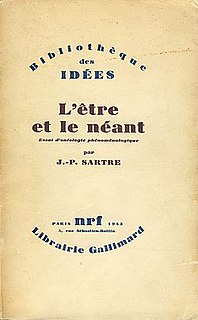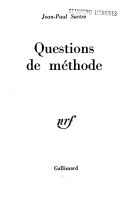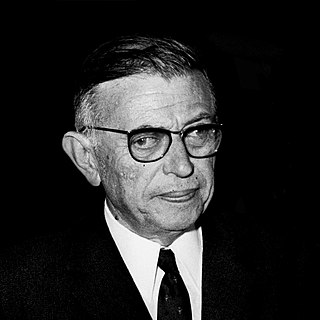
Existentialism is a tradition of philosophical inquiry associated mainly with certain 19th and 20th-century European philosophers who, despite profound doctrinal differences, shared the belief that philosophical thinking begins with the human subject—not merely the thinking subject, but the acting, feeling, living human individual. While the predominant value of existentialist thought is commonly acknowledged to be freedom, its primary virtue is authenticity. In the view of the existentialist, the individual's starting point is characterized by what has been called "the existential attitude", or a sense of disorientation, confusion, or dread in the face of an apparently meaningless or absurd world. Many existentialists have also regarded traditional systematic or academic philosophies, in both style and content, as too abstract and remote from concrete human experience.

Simone Lucie Ernestine Marie Bertrand de Beauvoir was a French writer, intellectual, existentialist philosopher, political activist, feminist and social theorist. Though she did not consider herself a philosopher, she had a significant influence on both feminist existentialism and feminist theory.
"Nothing", used as a pronoun subject, denotes the absence of a something or particular thing that one might expect or desire to be present or the inactivity of a thing or things that are usually or could be active. As a predicate or complement "nothing" denotes the absence of meaning, value, worth, relevance, standing, or significance. "Nothingness" is a philosophical term that denotes the general state of nonexistence, sometimes reified as a domain or dimension into which things pass when they cease to exist or out of which they may come to exist, e.g., God is understood to have created the universe ex nihilo, "out of nothing."

Existentialism Is a Humanism is a 1946 work by the philosopher Jean-Paul Sartre, based on a lecture by the same name he gave at Club Maintenant in Paris, on 29 October 1945. In early translations, Existentialism and Humanism was the title used in the United Kingdom; the work was originally published in the United States as Existentialism, and a later translation employs the original title. The work, once influential and a popular starting-point in discussions of Existentialist thought, has been widely criticized by philosophers, including Sartre himself, who later rejected some of the views he expressed in it.

Being and Nothingness: An Essay on Phenomenological Ontology, sometimes published with the subtitle A Phenomenological Essay on Ontology, is a 1943 book by the philosopher Jean-Paul Sartre, in which the author asserts the individual's existence as prior to the individual's essence and seeks to demonstrate that free will exists. While a prisoner of war in 1940 and 1941, Sartre read Martin Heidegger's Being and Time (1927). Heidegger's work, an ontological investigation through the lens and method of Husserlian phenomenology, initiated Sartre's own philosophical enquiry.

Nausea is a philosophical novel by the existentialist philosopher Jean-Paul Sartre, published in 1938. It is Sartre's first novel and, in his own opinion, one of his best works.
Feminism is a collection of movements aimed at defining, establishing, and defending equal political, economic, and social rights for women. Existentialism is a philosophical and cultural movement which holds that the starting point of philosophical thinking must be the individual and the experiences of the individual, that moral thinking and scientific thinking together are not sufficient for understanding all of human existence, and, therefore, that a further set of categories, governed by the norm of authenticity, is necessary to understand human existence. This philosophy analyzes relationships between the individual and things, or other human beings, and how they limit or condition choice.
Bad faith is a philosophical concept utilized by existentialist philosophers Simone de Beauvoir and Jean-Paul Sartre to describe the phenomenon in which human beings, under pressure from social forces, adopt false values and disown their innate freedom, hence acting inauthentically. It is closely related to the concepts of self-deception and ressentiment.
Danish philosophy has a long tradition as part of Western philosophy.
In philosophy, facticity has a multiplicity of meanings from "factuality" and "contingency" to the intractable conditions of human existence.

Saint Genet, Actor and Martyr is a book by the French philosopher Jean-Paul Sartre about the writer Jean Genet especially on his The Thief's Journal. It was first published in 1952. Sartre described it as an attempt "to prove that genius is not a gift but the way out that one invents in desperate cases." Sartre also based his character Goetz in his play The Devil and the Good Lord (1951) on his analysis of Genet's psychology and morality. Sartre has been credited by David M. Halperin with providing, "a brilliant, subtle, and thoroughgoing study of the unique subjectivity and gender positioning of gay men".
The proposition that existence precedes essence is a central claim of existentialism, which reverses the traditional philosophical view that the essence of a thing is more fundamental and immutable than its existence. To existentialists, human beings—through their consciousness—create their own values and determine a meaning for their life because the human being does not possess any inherent identity or value. That identity or value must be created by the individual. By posing the acts that constitute them, they make their existence more significant.

Human, All Too Human is a three-part 1999 documentary television series co-produced by the BBC and RM Arts. It follows the lives of three prominent European philosophers: Friedrich Nietzsche, Martin Heidegger and Jean-Paul Sartre. The theme revolves heavily around the school of philosophical thought known as Existentialism, although the term had not been coined at the time of Nietzsche's writing and Heidegger declaimed the label.
Atheistic existentialism is a kind of existentialism which strongly diverged from the Christian existential works of Søren Kierkegaard and developed within the context of an atheistic world view. The philosophies of Søren Kierkegaard and Friedrich Nietzsche provided existentialism's theoretical foundation in the 19th century, although their differing views on religion proved essential to the development of alternate types of existentialism. Atheistic existentialism was formally recognized after the 1943 publication of Being and Nothingness by Jean-Paul Sartre and Sartre later explicitly alluded to it in Existentialism is a Humanism in 1946.
Papa Sartre is a famous Arabic novel by Iraqi writer Ali Bader, it was originally published in Arabic in Beirut, 2001, and met warmly by the cultural critics and Intellectuals in Arabic world. An English translation was published in 2009, in AUC press, Cairo/ New York City. It was this book that earned Ali Bader many prizes.

Search for a Method or The Problem of Method is a 1957 essay by Jean-Paul Sartre, in which he attempts to reconcile Marxism with existentialism. The first version of the essay was published in the Polish journal Twórczość; an adapted version appeared later that year in Les Temps modernes, and later served as an introduction for Sartre's Critique of Dialectical Reason. Sartre argues that existentialism and Marxism are compatible, even complementary, even though Marxism's materialism and determinism might seem to contradict the abstraction and radical freedom of existentialism.

Sartre Studies International is a journal published by Berghahn Books in association with the United Kingdom Sartre Society and North American Sartre Society, and focuses on the philosophical, literary and political issues originating in existentialism, and explores the continuing vitality of existentialist and Sartrean ideas in contemporary society and culture. Each issue contains a reviews section and a notice board of current events, such as conferences, publications and media broadcasts linked to Jean Paul Sartre's life, work and intellectual legacy.
It is edited conjointly by Jean-Pierre Boulé, Bruce Baugh, David Drake, David Detmer.

Sartre: Romantic Rationalist is a book by Iris Murdoch. Published in 1953 by Bowes & Bowes of Cambridge, it was Murdoch's first book and the first book about Jean-Paul Sartre's work to be published in English.











